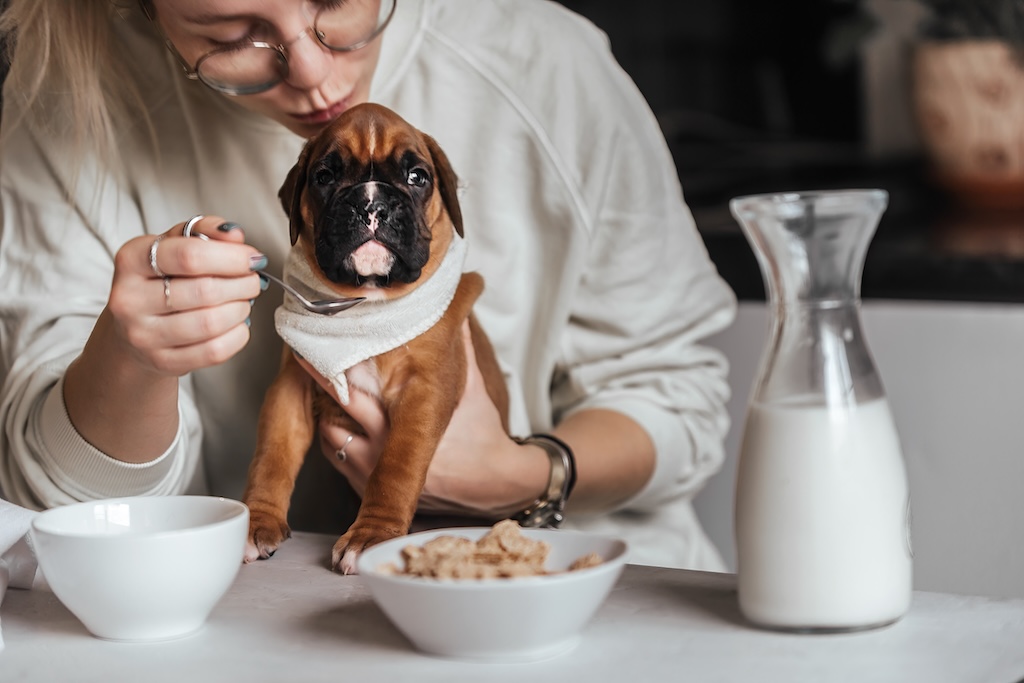Share This Article
It’s no surprise that your dog goes crazy the second you open up a jar of peanut butter. This sweet, sticky goodness is irresistible, but is it safe to eat?
This blog covers your dog’s love for this delicious spread and a few risks you should consider.
Why Do Dogs Love Peanut Butter?
There are several explanations behind your dog’s fondness for peanut butter. From their craving for protein-rich food to the aroma of this sweet treat, many factors attract your dog to that jar of golden deliciousness.
- Their nutritional need for protein
Dogs crave things rich in essential nutrients needed by their body. For dogs, having protein in their diet is crucial as it develops their muscles, immune system, and skin and hair cells. It is also highly beneficial in repairing tissues. Naturally, your dog enjoys having peanut butter due to its high protein content.
- Aroma
As mentioned above, dogs must eat food full of protein and fats. The roasted aroma of peanut butter signals the presence of these nutrients to your dog, instantly compelling them to plead with you to share it!
- Fat, salt, and sugar
Some veterinarians believe that canines love peanut butter due to the rich and unique flavors of the fat and sodium present. That is because, in the wild, their meals lack these ingredients. The novel appeal of these components attracts your dog to this treat!
- Their pet parents love it!
Your dog views you as the leader of the pack. In the wild, canines follow their leader, and the pet parent takes on that role for these domesticated furballs. Since your dog sees you eating peanut butter, it’s only natural that they want some too. This is why you can’t enjoy a PB&J sandwich without your dog getting excited to have a lick!
Now you know the possible explanations behind your dog’s fascination with peanut butter; however, is it safe for your pup to consume?
Is it safe for your puppy?

Your pup may love to lick a spoonful of peanut butter, but how safe is it to indulge in this human food? While it is generally considered safe to be consumed by canines, commercially made peanut butter may contain toxic ingredients. Keep an eye out for the following:
- Xylitol: Check the ingredients on the pack. If it contains xylitol, an artificial sweetener, keep it away from your dog. This ingredient is highly toxic and deadly for canines.
- Added Sugar: If the peanut butter has added sugar, it can lead to obesity.
Consult a vet before feeding your pup peanut butter or any food designed for humans. Peanut butter has high sodium and fat content, which can be harmful to dogs with underlying health issues.
How much peanut butter can your dog consume?
Most veterinarians are frequently asked, ‘ Is it okay to give my dog peanut butter every day?’ The answer may vary depending on your dog’s health and what your vet considers best for your puppy. A general rule is to feed everything in moderation.
Treats should only comprise about 10% of your dog’s daily calorie intake. Make sure you do not exceed this mark, and always check the label for ingredients. Variations in the quantity you can feed your puppy depend on its size, health, and daily calorie intake. For small dogs, give half a teaspoon once or twice a day; for medium and large dogs, give one teaspoon twice a day.
Try organic, unsalted options or peanut butter-flavored dog treats if your puppy loves peanut butter. However, if your dog is allergic to peanut butter, you should completely avoid it.
In severe cases, if the allergic reaction is not treated immediately, it can be fatal. This is why consulting your vet is crucial before adding anything to your dog’s diet.
Common signs of an allergic reaction are:
- Reddening of the skin
- Excessive scratching and licking
- Losing fur
- Becoming disoriented or losing focus
- Vomiting and diarrhea
- Difficulty breathing and swelling of the face. This could be life-threatening and requires immediate attention.
If you’ve established that your dog is not allergic and have received the green signal from your vet, you can give peanut butter to your pup as an occasional treat.
There are different ways to add it to your dog’s diet in moderation. We have shared a few tips below:
Tips for feeding peanut butter to your dog
With medicines: If your dog is stubborn when it comes to taking its meds, hide the tablet in a small amount of peanut butter and watch your pup gobble it down.
With food toys: You can enhance your puppy’s playtime and treat boredom with peanut butter. Fill a small amount in a food toy and keep your furry friend entertained for hours!
While training: Positive reinforcement is the key to successful training. Treats are a big part of that process, and if your dog loves peanut butter, there is no better way to reward it!
As a distraction: Peanut butter serves as a great distraction. If your dog is stressed during grooming or trimming its nails, redirect your puppy’s attention by holding a spoonful of peanut butter in front of it.
Your dog’s love for peanut butter makes it a great choice as an occasional treat. Canines crave it due to their intrinsic need to go after nutritionally rich foods and natural peanut butter is full of the goodness of protein. You can use this spread in multiple ways but remember to limit the calories from snacks to 10% of the total share.
Going with a healthier, organic option is better, but if you use commercially made peanut butter, check the label to ensure it does not contain any ingredients toxic to dogs. This way, you can both enjoy this treat together without worrying about your pet.

